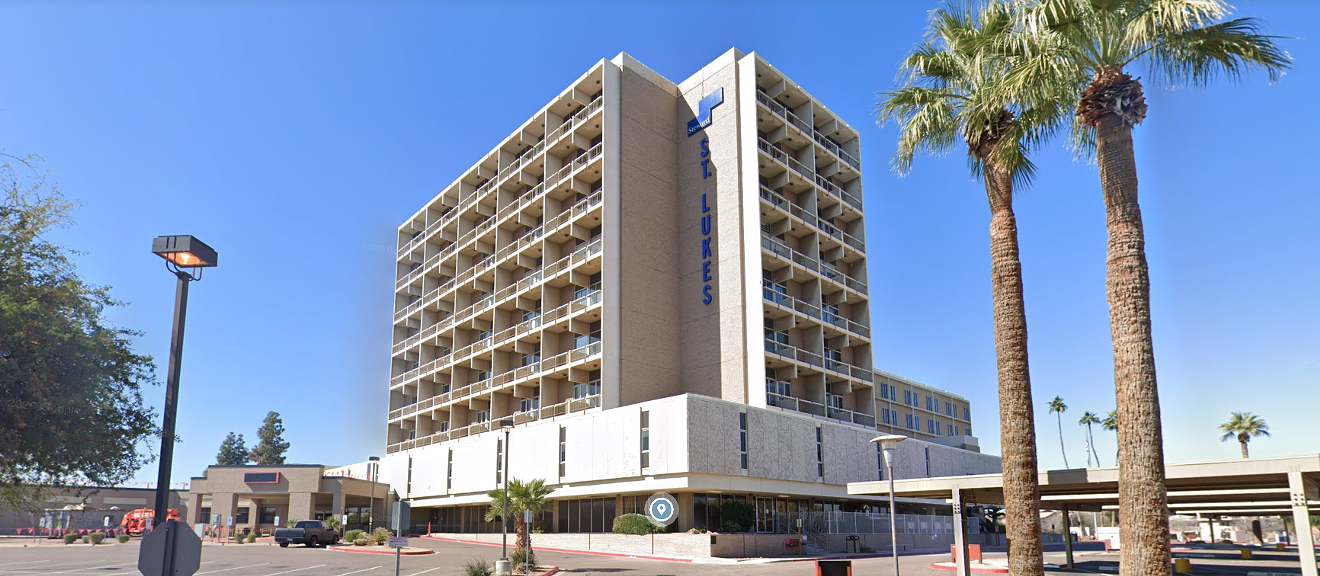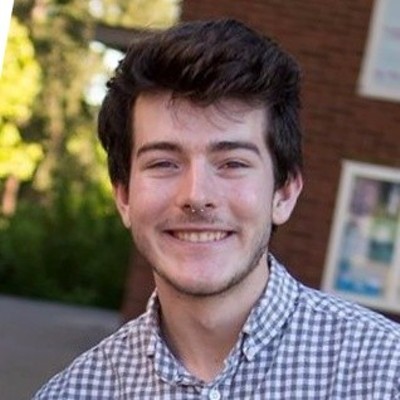Phoenix city councilmembers Sal DiCiccio and Michael Nowakowski have a wild idea: Take the entirety of the Human Services Campus near downtown Phoenix, move it approximately three miles east to the former St. Luke's campus, make it bigger, and get the state and county to help pay for it.
As you can imagine, there are a lot of questions.
The Human Services Campus is a 13-acre one-stop-shop for people experiencing homelessness. It offers meals, medical care, legal assistance, shelter, and more from 15 different organizations.
Currently, the campus and neighboring André House are seeking a change in zoning that would let them add several hundred more shelter beds to better accommodate many people now living on the street. DiCiccio and Nowakowski present this as an alternative solution.
"Many of the neighborhoods surrounding the campus — already under siege — are fighting to prevent [the zoning change] due to the extraordinary impacts of so many chronic street-homeless being concentrated in their neighborhood," the two wrote in a press release sent out on Wednesday night. "They're right, but so are homeless advocates who say we need more shelter and low-income housing options."
It's easy to see why Nowakowski, whose district includes the campus and who tried to storm Mayor Kate Gallego's press conference in March when she announced her support for the zoning expansion, would want the campus and the vocal neighborhood groups out of his hair. Coincidentally, the proposal would move the campus squarely into the district of Carlos Garcia, the council's most lefty member. But what's DiCiccio's stake?
Part of the answer may lie with his chief of staff, Sam Stone. Stone is a true believer in the plan, which is the result of two years of research by him and many conversations with DiCiccio. He said he's flown to a half-dozen cities on his own dime to check out their responses to homelessness, and when he goes for walks near city halls he'll chat with homeless people. What bothers him is all the points where a simple intervention could have made a huge difference in their lives.
"There's is no great solution but we feel very strongly we can do better," he said.
He hopes that having a new project to rally around will bring the state and county to the table — the two missing ingredients, many at the city believe, as Phoenix has borne the brunt of the crisis. Buying St. Luke's, a recently-closed hospital on around 24 acres of land currently serving as a backup state COVID-19 facility, is a rare opportunity, he said.
Unfortunately, this small band is entering a fraught and complex issue. Stone acknowledged that it's still only an initial plan — the next step is to ask the city staff to begin researching how it could work. There are countless questions that need to be answered, not the least of which is whether the state and county are willing to invest in a new capital project while facing down COVID-19 budget crunches.
Among the issues:
DiCiccio and Nowakowski's statement says that St. Luke's is "significantly" more isolated from surrounding neighborhoods than the Human Services Campus. The hospital's emergency-room entrance is about 250 feet from the nearest home's front door, and the property is bordered on two sides by public housing developments and some of the poorest neighborhoods in the city.
The statement also claims that selling the Human Services Campus property would generate funds to assist with building more shelters across the Valley, even though the land under St. Luke's is currently valued at over twice what the Human Services Campus parcels are, according to online records from the Maricopa County Assessor's Office.
Finally, there are several services and shelter providers located around the Human Services Campus, André House and the Justa Center among them, that offer crucial assistance but aren't technically in the campus.
Stone's answer to these basically comes back to hoping for state and county funding. With that funding, according to Stone, you could construct more shelters throughout the valley and better facilities at St. Luke's so that fewer clients go into the surrounding neighborhoods; you could use it for the actual purchase of St. Luke's, thereby freeing up the money from the hypothetical Human Services Campus sale for additional shelters; and you could potentially construct space for the other charities on the St. Luke's campus or replicate what they offer.
"You've got such a large facility there at St. Luke's, it gives you different wings for different purposes," he said.
As for the estimates about the profit that could be made from a deal, Stone said those are based on DiCiccio's understanding of development in the Valley. Not having to tear down the St. Luke's hospital building would save money on the deal, and the light rail will increase property values for potential development at the current Human Services Campus location, Stone said.
To say Carlos Garcia, the councilmember whose district includes St. Luke's, is skeptical, would be an understatement.
"My first thought is that it's not based in reality," he said. He called the plan, which he said he had not been consulted on, a political move coming out of nowhere.
Garcia said he's not opposed to creating more infrastructure in his district but said that it needs to be in consultation with unsheltered people and the organizations serving them. He's curious about how it will be funded and said that waiting for state or county assistance has been an excuse to not step up at a city level.
"It's a long-term issue that we have to be intentional [about] and we have to work on," he said.
Also not consulted on the plan was Human Services Campus Executive Director Amy Schwabenlender. In a phone call with Phoenix New Times, Stone lashed out at her, claiming she and others at the campus had been unreasonable and that the zoning measure would not pass because she had been unwilling to acknowledge the impact on the surrounding communities.
In response, Schwabenlender said that the campus has worked to do street cleaning and to address neighborhood concerns, including through a series of stipulations that are actually part of the zoning proposal.
"Mr. DiCicio [sic] poses an interesting idea and we do hope the city looks into the concept. In the meantime, we are in the midst of a crisis that the Human Services Campus and our 15 partner organizations address every day," she said in a constrained statement provided through a spokesperson.
She emphasized the need for a comprehensive solution with shelters spread out through the valley.
Even one of her opponents in the zoning fight agrees with her.
Jessica Bueno, the outspoken president of the Oakland Neighborhood Association, is one of the neighbors fighting the campus expansion. One of the people DiCiccio and Nowakowski present their idea as a solution for. But she's not interested.
"I'm actually really disappointed," she told New Times. At least the current Human Services Campus location is in a somewhat-industrial area, not right in the middle of a growing public housing community, she said. She also wants to see more small shelters spread out through the Valley, not just the problems dropped on someone else.
"Putting it in another low-income neighborhood is not the answer," she said.
[
{
"name": "Air - MediumRectangle - Inline Content - Mobile Display Size",
"component": "18478561",
"insertPoint": "2",
"requiredCountToDisplay": "2"
},{
"name": "Editor Picks",
"component": "16759093",
"insertPoint": "4",
"requiredCountToDisplay": "1"
},{
"name": "Inline Links",
"component": "17980324",
"insertPoint": "8th",
"startingPoint": 8,
"requiredCountToDisplay": "7",
"maxInsertions": 25
},{
"name": "Air - MediumRectangle - Combo - Inline Content",
"component": "16759092",
"insertPoint": "8th",
"startingPoint": 8,
"requiredCountToDisplay": "7",
"maxInsertions": 25
},{
"name": "Inline Links",
"component": "17980324",
"insertPoint": "8th",
"startingPoint": 12,
"requiredCountToDisplay": "11",
"maxInsertions": 24
},{
"name": "Air - Leaderboard Tower - Combo - Inline Content",
"component": "16759094",
"insertPoint": "8th",
"startingPoint": 12,
"requiredCountToDisplay": "11",
"maxInsertions": 24
}
]












